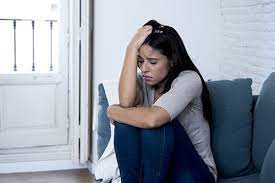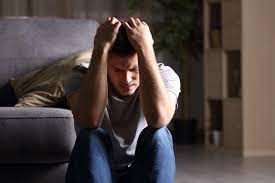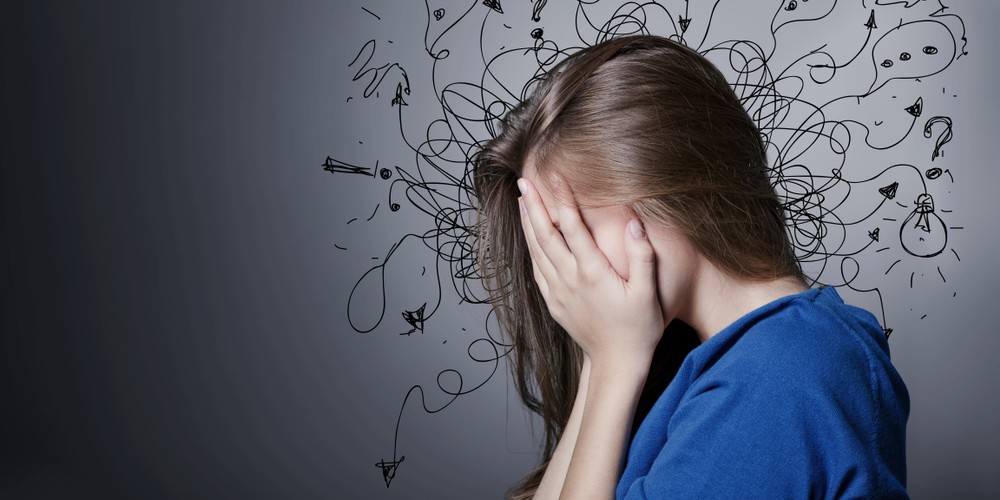Anxiety attacks can be very frightening and seem to come out of nowhere. If you have ever experienced an anxiety attack, then you know how scary it can be. In this blog post, we will discuss the top 11 anxiety attack symptoms so that you can better recognize them if they happen again. We will also provide some tips on how to deal with an anxiety attack should one occur.
Contents
What Is An Anxiety Attack?
 An anxiety attack is a sudden feeling of anxiety and fear. It may be accompanied by physical symptoms such as a racing heart, sweating, and shaking. An anxiety attack is not the same as an anxiety disorder, although people with anxiety disorders may experience anxiety attacks.
An anxiety attack is a sudden feeling of anxiety and fear. It may be accompanied by physical symptoms such as a racing heart, sweating, and shaking. An anxiety attack is not the same as an anxiety disorder, although people with anxiety disorders may experience anxiety attacks.
These attacks usually can occur without warning and may peak within minutes. During an anxiety attack, you may feel like you can’t breathe, or have chest pain. In fact, you may feel like you’re going to faint or have a heart attack.
Moreover, an anxiety attack is described as a short-term event, lasting anywhere from a few minutes to half an hour. However, the feeling of anxiety and fear may linger long after the attack has passed. Also, studies suggest that an attack occurs more frequently in women than men.
So, if you experience anxiety and fear that are accompanied by physical symptoms, you may be having an anxiety attack. It is important to seek help if you think you may be having an anxiety attack. There are treatments available that can help you manage your symptoms.
What Are The Anxiety Attack Symptoms?
The symptoms of an anxiety attack can be very frightening. Here are the top 11 anxiety attack symptoms that can help you recognize anxiety attacks. These include:
Heart Palpitations or a Racing Heart
This symptom of an anxiety attack is caused by the fight-or-flight response. When you are experiencing an anxiety attack, your heart rate increases as your body prepares to either face or flee the perceived danger. And, as your heart races, you may feel like your chest is tight or that you can’t catch your breath. Moreover, this symptom can be accompanied by sweating, trembling, or dizziness.
Sweating
Anxiety attacks can cause your body to sweat more than usual. This sweating may be caused by the increased heart rate that comes with an anxiety attack. Often, sweating is the most common and easily recognizable symptom of an anxiety attack. This is because sweating can occur when you are anxious, nervous, or under stress.
Shaking or Trembling
 Anxiety attacks can cause your body to shake or tremble. This may be due to the increased heart rate and adrenaline that come with an anxiety attack. More often, shaking or trembling is a symptom of an impending panic attack. The shaking experience in an anxiety attack is often described as feeling like jelly.
Anxiety attacks can cause your body to shake or tremble. This may be due to the increased heart rate and adrenaline that come with an anxiety attack. More often, shaking or trembling is a symptom of an impending panic attack. The shaking experience in an anxiety attack is often described as feeling like jelly.
Hyperventilation
Hyperventilation is a common symptom of anxiety attacks. When you hyperventilate, you breathe faster than normal. This can cause you to feel lightheaded, dizzy, or even faint. In some cases, hyperventilation can also cause chest pain. Also, hyperventilation can lead to a feeling of being unable to catch your breath.
Feelings of Nausea or an Upset Stomach
Anxiety attacks can cause you to feel nauseous or have an upset stomach. This is because the increased heart rate and adrenaline that come with anxiety can disturb your digestive system. In some cases, nausea and an upset stomach can also be caused by the stress of an anxiety attack.
Hot Flashes or Chills
Anxiety attacks can cause your body temperature to fluctuate. You may experience hot flashes or chills during an anxiety attack. This is due to the increased heart rate and adrenaline that comes with an anxiety attack.
Muscle Tension or Aches
Anxiety attacks can cause your muscles to tense up. This is because the increased adrenaline and cortisol that comes with an anxiety attack can prepare your body for a fight-or-flight response. As a result, you may experience muscle tension or aches. In addition, this symptom can also be caused by the stress of an anxiety attack.
Fatigue
Anxiety attacks can cause you to feel fatigued. This is because the increased heart rate and adrenaline that come with an anxiety attack can tax your body’s energy reserves. Additionally, this symptom can also be caused by the stress of an anxiety attack. Fatigue is generally a sense of tiredness or low energy.
Shortness of Breath
 During the anxiety attack, you may feel short of breath. Shortness of breath is a feeling that you can’t get enough air. You may feel like you’re suffocating or gasping for air. This feeling of not being able to breathe can be very frightening. An anxiety attack happens because of hyperventilation. When you’re anxious, you tend to take shallow breaths. This causes you to exhale more carbon dioxide than normal and can lead to difficulty breathing.
During the anxiety attack, you may feel short of breath. Shortness of breath is a feeling that you can’t get enough air. You may feel like you’re suffocating or gasping for air. This feeling of not being able to breathe can be very frightening. An anxiety attack happens because of hyperventilation. When you’re anxious, you tend to take shallow breaths. This causes you to exhale more carbon dioxide than normal and can lead to difficulty breathing.
Dizziness or Lightheadedness
You may feel dizzy or lightheaded during an anxiety attack. You may feel like you’re going to faint or pass out. This feeling is caused by a decrease in blood flow to your brain. When you’re anxious, your heart rate increases, and your blood vessels constrict. This can lead to a decrease in blood flow to your brain, which can cause dizziness or lightheadedness.
Chest Pain
During an anxiety attack, you may experience chest pain. The chest pain is usually a sharp, squeezing pain. It may feel like someone is trying to crush your chest. The chest pain is caused by the increased heart rate and blood pressure during an anxiety attack. It eventually creates a feeling of choking or suffocation.
So, these are some common symptoms that you may experience during an anxiety attack. If you experience any of these symptoms, it’s important to seek medical help. Anxiety attacks can be very frightening and overwhelming, but with proper treatment, they can be managed.
Are Anxiety Attacks And Panic Attacks Different?
Anxiety attacks and panic attacks share many of the same symptoms. Both can cause an intense feeling of fear or anxiety. But there are some key differences between the two conditions. These differences include:
- Anxiety attacks usually last for a few minutes. While panic attacks can last for several hours.
- Panic attacks are also much more likely to include physical symptoms, such as a pounding heart, shortness of breath, and sweating.
- Anxiety attacks are more likely to be triggered by a specific event or worry. Panic attacks can happen without any obvious trigger.
- Both start with differentials like increased heart rate, shortness of breath, and sweating. But anxiety attacks are more often characterized by anticipatory worry. Whereas panic attacks are more often characterized by a sense of impending doom.
- These both are also different in terms of duration and physical symptoms. Anxiety attacks usually only last for a few minutes. While panic attacks can last for several hours. Panic attacks are also much more likely to include physical symptoms like a pounding heart, shortness of breath, and sweating.
So, these are some of the key differences between anxiety attacks and panic attacks. It is important to know these differences so that you can better understand your condition and get the treatment that you need.
However, both conditions are serious and can be very debilitating. If you are experiencing either of these, it is important to seek professional help. There are treatments available that can help you to manage your symptoms and live a full and healthy life.
What Are The Consequences Of Anxiety Attacks?
 When you experience an anxiety attack, you may feel like you’re going to die or have a heart attack. It can be very frightening. The physical symptoms of an anxiety attack can create complications in your life. These complications include:
When you experience an anxiety attack, you may feel like you’re going to die or have a heart attack. It can be very frightening. The physical symptoms of an anxiety attack can create complications in your life. These complications include:
- heart problems
- frequent cold and flu
- digestive issues
- headache
- insomnia
- muscle tension
- fatigue
Anxiety attacks can also lead to depression and other mental health problems. If you’re having anxiety attacks, it’s important to seek help from a mental health professional. As this type of attack occurs due to an imbalance of chemicals in the brain, they will be able to offer you medication to help correct this.
In addition, they can provide you with coping and relaxation techniques. Left untreated anxiety attacks can have numerous negative impacts on your life. Therefore, it’s essential to get the help you need to deal with them. Otherwise, anxiety attacks can be scary and debilitating.
How To Treat Anxiety Attacks?
The treatment for anxiety attacks is both psychological and pharmacological.
Psychological Treatments
The psychological way is to help the patient to understand and manage their anxiety. The techniques used in this process are as follows:
- Cognitive-behavioral therapy – CBT works to change the thinking patterns and behaviors that contribute to anxiety.
- Exposure therapy – This is a technique in which patients are gradually exposed to the situations they fear.
Therapies are always believed to be more effective when combined with medication. So, it is important to find the right therapy and the suitable therapist for you. If you’re unable to find a therapist for your needs, then contact Mantra Care. It is a platform that will help you to connect with the right mental health professional for your needs.
Pharmacological Treatments
The most common type of medication prescribed for anxiety is antidepressants. These include:
- Selective serotonin reuptake inhibitors – SSRIs are the most commonly prescribed type of antidepressant. They work by increasing levels of serotonin in the brain.
- Serotonin and norepinephrine reuptake inhibitors – SNRIs are another type of antidepressant that works by increasing levels of both serotonin and norepinephrine.
- Benzodiazepines – Benzodiazepines are a type of anti-anxiety medication that can be helpful in reducing anxiety symptoms. However, they can also be addictive and should only be used short term.
So, these medications are typically used to help people deal with their anxiety in the short term. If you are thinking about taking medication for your anxiety, it’s important to talk to your doctor to figure out which one is right for you. In fact, it’s often recommended that people try other methods of treatment first, such as therapy, before resorting to medication.
Natural Remedies
 This is often the first thing people think of when they hear the word anxiety. There are many different herbs and supplements that can help with anxiety. Some of the most popular ones include:
This is often the first thing people think of when they hear the word anxiety. There are many different herbs and supplements that can help with anxiety. Some of the most popular ones include:
- Chamomile – This herb has been used for centuries to calm nerves and ease anxiety. It can be found in tea form or as a supplement.
- Lavender – This is another popular herb that has a calming effect. It can be used in a diffuser, added to bathwater, or made into tea.
- Valerian Root – This is a common supplement that is taken to help with anxiety and insomnia.
There are many other herbs and supplements that can help with anxiety. Some people find that a combination of different herbs works best for them. It is important to talk to a doctor before taking any supplements, as they can interact with other medications. Overall, natural remedies are believed to become effective for those with mild to moderate forms of anxiety.
These are some professional and personal tips that can help you to manage your anxiety and prevent anxiety attacks. If you are struggling with anxiety, please reach out to a mental health professional for help. Anxiety is a real and serious condition that should not be ignored. Remember, you are not alone in this!
Some Helpful Tips To Prevent Anxiety Attacks
There are some things you can do to help prevent anxiety attacks. These helpful tips are:
Recognize The Early Symptoms
It is the prominent thing you can do to prevent an attack. If you know the early symptoms of anxiety attacks, you will be able to catch them. Before it gets too bad.
Some early symptoms include:
- feeling restless or irritable
- having a sense of dread
- feeling like your mind is racing
If you notice any of these symptoms, try to take some deep breaths and relax. This will help to calm you down and prevent the attack from getting worse.
Talk To Someone Who Will Understand
If you are feeling anxious, it is important to talk to someone who will understand. This can be a friend, family member, therapist, or anyone else who can offer support. Talking to someone can help to relieve some of the stress and anxiety you are feeling. In fact, it is believed that talking about your anxiety can help to reduce the symptoms.
Exercise Regularly
Exercise is a great way to help reduce stress and anxiety. It has also been shown to be helpful in preventing anxiety attacks. Exercise releases endorphins, which have mood-boosting effects. This can help to improve your overall mood and reduce the likelihood of having an anxiety attack.
Get Enough Sleep
 Sleep is important for overall health and well-being. It is also essential for reducing stress and anxiety. Lack of sleep can trigger anxiety attacks. So, be sure to get enough rest each night. As anxiety is caused by stress, try to avoid anything that will add to your stress levels. This includes things like caffeine, alcohol, and nicotine. Eventually, you will get better.
Sleep is important for overall health and well-being. It is also essential for reducing stress and anxiety. Lack of sleep can trigger anxiety attacks. So, be sure to get enough rest each night. As anxiety is caused by stress, try to avoid anything that will add to your stress levels. This includes things like caffeine, alcohol, and nicotine. Eventually, you will get better.
Intake Healthy Diet
A healthy diet always has a good impact on our health. It helps to improve our immune system and prevent us from diseases. The same goes for anxiety, eating healthy foods, will help us to reduce the symptoms of anxiety. And also prevent us from having an attack. Some healthy diet food includes:
- yogurt
- dark chocolate
- oats
- bananas
- Green tea
- walnuts
This minor change in your diet can have a significant impact on your anxiety levels.
Socialization is really important to prevent anxiety. Isolation can trigger anxiety attacks. So, it is important to be social and interact with others on a regular basis. This can help to reduce stress and anxiety levels. In fact, studies have shown that social interaction can help to reduce the symptoms of anxiety. More often, people who suffer from anxiety tend to isolate themselves. So, it is important to make an effort to be social.
Therefore. these are some helpful tips to prevent anxiety attacks. If you follow these tips, you will be able to reduce the symptoms of anxiety. And also prevent anxiety attacks.
Conclusion
To conclude, anxiety attack symptoms are actually pretty easy to spot if you know what to look for. The main thing is to stay calm and relax as much as possible, which will help ease the symptoms. If you feel like you’re having an anxiety attack, don’t be afraid to seek medical help. Because anxiety attacks can have a toll on your health if not treated properly on time.
This condition can be really tough to deal with but you are not alone. There are a lot of people who suffer from anxiety attacks every day. And with the right help, you can manage your condition and live a normal life.
For more information, please contact MantraCare. Anxiety is a common mental health condition characterized by persistent feelings of worry, fear, and apprehension. If you have any queries regarding Online Anxiety Counseling experienced therapists at MantraCare can help: Book a trial Anxiety therapy session


